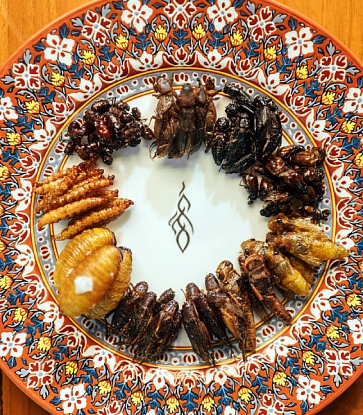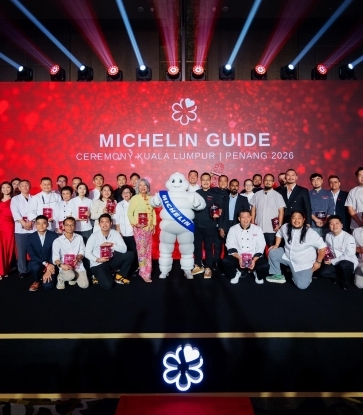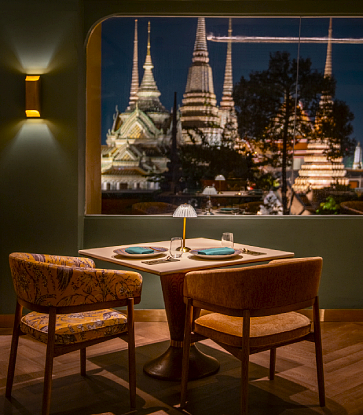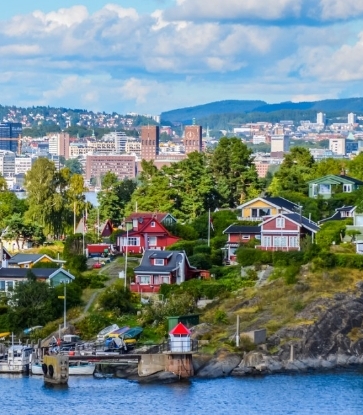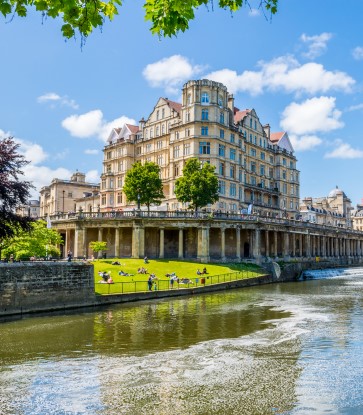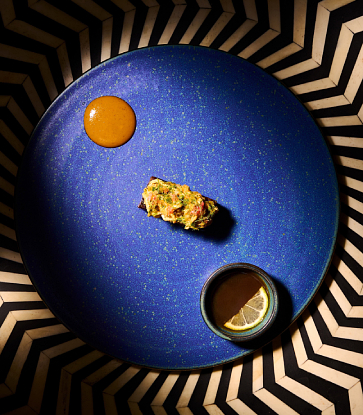When Chef Jimmy Ophorst of PRU (One MICHELIN Star, MICHELIN Guide Thailand 2021) received a MICHELIN Green Star at the Star Revelation ceremony in 2021, he declared, “we strive to promote our ‘Dine Good, Do Good’ philosophy by reducing, as much as possible, our carbon footprint, chemical use, and food waste and by mainly using locally sourced, seasonal ingredients.”
With that, PRU took a leading role among Thailand’s restaurants championing sustainable practices. Foodies and gourmands far and wide may know this restaurant for its artistic presentations and signature dishes such as pickled egg from Chef Ophorst and his team. But behind the scenes of this gorgeous dining establishment in the luxury seaside resort Trisara Phuket, just a little further inland on the island, is a down-to-earth secret to PRU’s success.
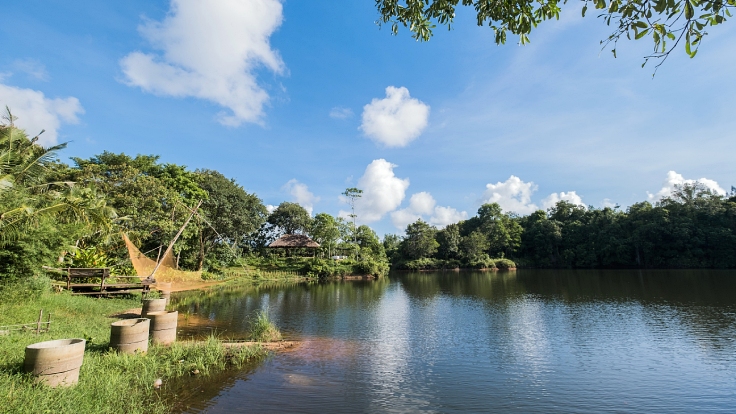
Chef Ophorst smiled broadly as he cleared away his son’s toys to make room for us and Chef Sujira “Aom” Pongmorn of Saawaan in his car. “Where we are going is about 15 minutes from Trisara.”
After a few turns along Phuket’s hilly roads, he explains how the island’s sea breezes lured him from honing his culinary skills at Gaggan in Bangkok. “Phuket is a paradise, with fertile forests and waters. It’s perfect for relaxing at the beach, but not really for cultivation because the island’s weather changes more than you think. There’s the ocean air, hilly forest terrain, monsoon winds, and the changing tides. All this affects the soil.”
Soon, we arrive at Pru Jampa, an organic farm named after the village where it is located. This treasure trove of garden delights covers nearly 96 hectares, a culinary playground bursting with aromas and flavours for Ophorst.
“Phuket has good soil, but if it rains too much or if the soil is too salty, that can affect cultivation. Everything starts with soil quality.” It sounds challenging, but the 30-year-old chef continues, “We can easily go to the market for excellent fruits and vegetables. But it’s important to know how nature works, the connections between the soil, the weather, and the plants. It helps me understand food better - seeing the journey from the soil to the plate. Farming is like cooking. Being inventive and trying new things, failing as well as succeeding.”

The name PRU is an acronym for “Plant, Raise, Understand”. It also has a geographic reference. In Thai, “pru” means peatland, a very fertile wetland terrain. So, they converted the unused land by the hotel into Pru Jampa, an organic farm where they raise chickens for their eggs, as well as farm fish, and cultivate myriad fruits, vegetables, flowers, and herbs. All together, along with rotating their crops, this creates a sustainable ecosystem to nourish the land and to support the local economy.
Here, they practice permaculture, eschewing modern techniques that rely on chemicals or synthetic products to solve issues rather than looking for the root of a problem. Permaculture, however, is a sustainable form of agriculture that takes a holistic view of nature and cultivation. Problems indicate an imbalance that provides opportunities to experiment, adjust, and solve for the long term, creating a symbiotic coexistence.
Chef Ophorst takes us on a walk so that we can appreciate the produce he raises with local farmers with whom he shares his innovative thinking. “Working with small, local farmers, fishermen, and producers can be challenging. I’m from a farming family, so I understand and try to share what I’ve learned about farming and the business of agriculture with everyone I can. I hope they can take that to improve their products and businesses as well.” This is what he told us when he received the MICHELIN Green Star at the end of last year.

He also works with farms around the country and goes foraging in the wild for ingredients to expand his knowledge and to enhance the dining experience. In 2020, his team joined in to conceive creative new dishes like the unique flavours of an eggplant dish featuring four different types of eggplant served with five different sauces.
“Taste this,” he offers a fresh mint leaf for us to try. Chef Pongmorn, winner of the MICHELIN Guide Young Chef Award, praises the vibrancy, freshness, and crispness that cannot be found at the market. So, it’s no wonder that dinner at PRU is like entering Chef Ophorst’s own amusement park, where he stars with his balancing act of ingredients, flavour, and love. All while showcasing “Plant. Raise. Understand.” by selecting locally sourced ingredients from nearby places like Phuket, Phang Nga, and Nakhon Phanom for exquisitely plated dishes to inspire the senses, such as Phuket lobster with strawberries and Wagyu beef with baby corn.

Furthermore, there is his regular food lover’s event, the Trisara Culinary Gastronomic Getaway. Chef Ophorst invites his talented friends such as Chefs Sujira “Aom” Pongmorn and Arisara “Paper” Chongphanitkul from Saawaan (One MICHELIN Star, MICHELIN Guide Thailand 2021) and Chefs Chandler Schultz and Kla Prakobkit from Seafood at Trisara (MICHELIN Plate, MICHELIN Guide Thailand 2021) to pick ingredients from Pru Jampa and have fun at Trisara getting their culinary creativity going as they help promote “Dine Good, Do Good”.
The Dutch chef reveals that over the years, the farmers have continued to develop their produce until the local communities prefer them. And as eating habits change, people understand more and have better access to a wider range of cuisines and ingredients, including those who plant and farm. If this leads to us being able to source products locally without having to rely on imports from across the globe...wouldn’t that be good?
Hero photo: © PRU



